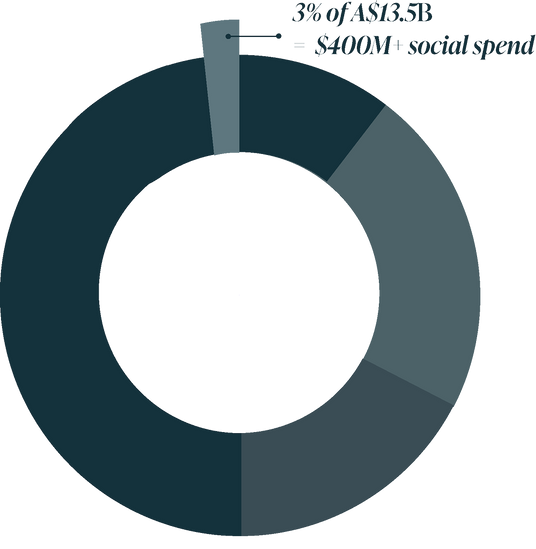The New Rules of Social Procurement in Australia
Across Australia, social procurement has moved from aspiration to obligation. Frameworks such as Victoria’s Social Procurement Framework (SPF), the NSW Procurement Policy Framework, and the Commonwealth Indigenous Procurement Policy (IPP) mandate that a measurable proportion of spend must go to certified social benefit suppliers.
These commitments are embedded into Victorian Government Purchasing Board (VGPB) rules and into contract terms nationally. They are binding, audited, and enforceable. Procurement officers must not only award spend to certified suppliers but also provide evidence that outcomes have been delivered.
What Social Procurement Really Means for ICT in Australia
Social procurement in 2025 is no longer a values-led initiative — it is a contractual, auditable compliance requirement across Australia. Frameworks such as Victoria’s Social Procurement Framework (SPF), VGPB rules, the NSW Procurement Policy Framework, and the Commonwealth Indigenous Procurement Policy (IPP) require agencies to prove that a measurable proportion of their spend flows through certified suppliers.
Major infrastructure projects now operate under high-value targets where even a three per cent requirement can translate into hundreds of millions of dollars in mandated certified spend. Social Procurement in Australia
Yet most traditional social enterprises are small, and mainstream ICT suppliers do not hold the certifications required to count toward compliance. This creates a persistent gap: ICT is one of the largest procurement categories in government and enterprise, but it is often excluded from social procurement reporting because suppliers simply aren’t eligible.
The Certification Gap — and Why ICT Is Underutilised
Without certification, spend is effectively “invisible” to compliance, regardless of scale. Social Procurement in Australia
TechForGood addresses this gap by being:
- a certified Social Enterprise (Social Traders)
- a B Corp Certified ICT Supplier
- a Carbon Neutral business
- a partner to Australian Disability Enterprises (ADEs)
This combination enables ICT spend — often high-volume and recurring — to be fully recognised within SPF, VGPB and IPP reporting frameworks.
Why ICT Is Now the Most Strategic Social Procurement Category
Your whitepaper demonstrates how relying on small categories increases fragmentation, overhead and audit exposure. Social Procurement in Australia
ICT, by contrast:
- is a large, essential, high-value category
- scales easily
- minimises procurement fragmentation
- centralises evidence & reporting
- pairs naturally with circular recovery through the Recover-E secure IT asset disposal service
- supports ASRS-aligned sustainability reporting
This makes ICT one of the most powerful levers to meet mandated social procurement objectives without inflating compliance effort.
Social Procurement + Audit Assurance in One Supplier
Audit reviews consistently highlight issues such as uncertified suppliers, double-counted spend, insufficient evidence and late reporting. Social Procurement in Australia
TechForGood removes these risks by ensuring:
- all spend is certified and countable
- certification evidence is provided for every transaction
- reporting aligns with ASRS assurance expectations
- ICT becomes an audit-first category
- social impact is traceable via Catalysing Connections
This creates one evidence pathway for procurement, sustainability and finance teams.
Beyond Compliance — Delivering Real Community and Environmental Impact
Social procurement should deliver real outcomes, not just satisfy a compliance requirement. With TechForGood, ICT procurement creates:
- Inclusive employment via Priority Jobseeker roles (women returning to work, migrants, Indigenous Australians and people with disabilities)
- Circular recovery through Recover-E, including secure data wiping and certified recycling
- Environmental progress through Carbon Neutral IT Procurement
- Community impact, directly funding our Catalysing Connections program
- Governance excellence through B Corp certification
This transforms mandatory spending into meaningful social and environmental return.
Who This Helps and Why Organisations Choose TechForGood
A recent state government case study shows how a $560m contract used ICT as the anchor category to deliver certified social procurement, ESG outcomes and assurance-ready reporting — while reducing cost and operational risk. Case Study - Delivering Social …
TechForGood is designed for organisations that:
- require SPF, VGPB or IPP compliance
- need audit-ready certified spend
- operate under ASRS sustainability reporting expectations
- want one supplier, one evidence trail and simplified compliance
The result is a procurement model where ICT spend becomes:
- certified
- auditable
- scalable
- impactful
- environmentally responsible
- cost-neutral
- easy to manage
TechForGood turns ICT into the category that delivers the biggest difference with the least friction.

Even small percentages equal massive dollar values in social procurement.
From Procurement Percentages to Real Pressure
On major projects, even small percentage targets translate into huge sums. For example, Melbourne’s Metro Tunnel Project, with a budget of A$13.5 billion, carried a three per cent requirement — equating to more than A$400 million that had to flow through certified suppliers.
Most social enterprises in Australia are small, with turnover below A$5 million. Meeting obligations at this scale by spreading spend across dozens of fragmented contracts creates monitoring overheads, compliance risks, and audit challenges.
Why Conventional ICT Resellers Fail Social Procurement Framework Tests
ICT procurement today is still dominated by conventional resellers and systems integrators. They deliver the technology efficiently — but they don’t qualify under social procurement frameworks. Why ?
- Certification is mandatory. Under SPF, only spend with certified social enterprises (via Social Traders), verified Indigenous businesses (via Supply Nation or Kinaway), or recognised Disability Enterprises counts. Mainstream ICT resellers don’t hold these certifications.
- Social enterprise status is required. Without it, procurement officers cannot report ICT spend as meeting obligations, no matter the value.
- Audit evidence is non-negotiable. Frameworks demand certification proof. Conventional resellers cannot provide it, so billions of dollars in ICT spend remain invisible to compliance.
The result: procurement teams under pressure push spend into categories like catering or cleaning — valuable, but too fragmented to absorb the scale of obligations.
What Compliance Requires
- Certification barriers
- Fragmented suppliers
- Limited impact visibility
What TechForGood Delivers
- Full compliance certification
- Single supplier channel
- Auditable impact reporting

Compliance

Certification

Data Security

Social Outcomes
Breaking the ICT Procurement Mould with a Certified Social Enterprise Supplier
By working with TechForGood, procurement teams can channel ICT budgets into a single certified supplier — making every dollar count toward SPF and VGPB ICT procurement targets, while complementing Indigenous Procurement Policy (IPP) compliance strategies.
- Channel large ICT budgets into a single certified supplier.
- Count hardware, cloud, software, and professional services spend towards mandated quotas.
- Access Recover-E IT Asset Disposal (ITAD) for secure recycling, data wiping, and auditable reporting.
- Deliver measurable social impact alongside essential ICT procurement.
National Procurement Frameworks — SPF, VGPB, IPP and Beyond
While Victoria’s SPF and VGPB rules are the most advanced, obligations apply nationally.
- VIC: SPF & VGPB rules mandate social procurement.
- NSW: Procurement Policy Framework requires social + environmental outcomes.
- Commonwealth: IPP sets mandatory minimums for Indigenous suppliers.
- QLD, SA, WA, ACT: embedding social and sustainable procurement.
- Disability: ADEs recognised but limited capacity.
The common thread? Certification + evidence. Without them, spend does not count.
Learn how these frameworks align with our Value Chain.
Frequently Asked Questions
What ICT spend counts toward the Social Procurement Framework (SPF) and VGPB requirements?
Eligible ICT spend includes purchases routed through certified social enterprises or suppliers that meet SPF or VGPB guidelines. All ICT purchases made through TechForGood contribute to social procurement outcomes.
How does TechForGood help us meet mandated social procurement targets?
Every ICT transaction is made through a certified social enterprise, generating auditable social procurement evidence that can be used for SPF, VGPB, B Corp and ESG reporting.
What documentation do you provide for social procurement audits or tender submissions?
Switch customers use invoices as evidence of social procurement and carbon neutral ICT purchasing. Enhance/Embed customers receive annual offset certificates, plus all customers receive recycling and landfill-diversion reporting through Recover-E.
Can we start with only part of our ICT spend (e.g., laptops or accessories)?
Yes. Many organisations begin with a single ICT category and expand over time. Even partial adoption strengthens compliance and reporting.







